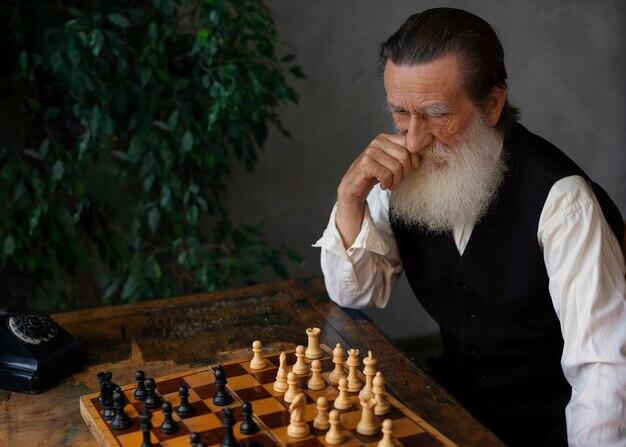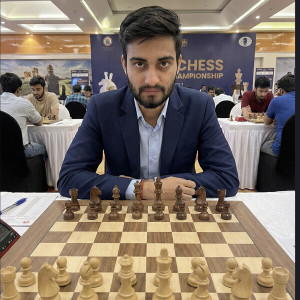Chess, often dubbed the "game of kings," has a rich history that spans centuries and continents. Its allure lies not only in the complexity of its strategies but also in the stories of the individuals who have dedicated their lives to mastering it. As we explore the distribution of chess grandmasters worldwide, we'll delve into the personal journeys of some of these remarkable players, shedding light on the cultural and historical contexts that have shaped their paths.

Understanding the Title of Grandmaster
Before we delve into the global distribution, it's essential to understand what it means to be a grandmaster. The title of Grandmaster (GM) is the highest honor awarded by FIDE, the International Chess Federation. Achieving this status requires exceptional skill, dedication, and consistent performance against top-tier opponents. The journey to becoming a grandmaster is often filled with personal sacrifices, rigorous training, and a deep passion for the game.
Top Countries with the Most Chess Grandmasters
Russia: A Legacy of Excellence
Russia's dominance in the chess world is unparalleled. With a deep-rooted tradition and state-sponsored programs, the country has produced a significant number of grandmasters. This legacy can be traced back to the Soviet era, where chess was promoted as a symbol of intellectual prowess.
Garry Kasparov, born Garik Kimovich Weinstein in Baku, Azerbaijan SSR, emerged as one of the most formidable players in history. His ascent to the world championship was marked by intense rivalries and a profound understanding of the game. Kasparov's journey was not just about his battles on the board but also his personal evolution amidst the political backdrop of the Soviet Union. His decision to adopt his mother's Armenian surname, Kasparov, was influenced by the socio-political environment of the time.
Another notable figure is Vladimir Kramnik, who dethroned Kasparov in 2000. Kramnik's style was characterized by deep strategic understanding and positional play. His victory was not just a personal achievement but also a testament to the rigorous training systems in place in Russia.

United States: The Rise of a New Powerhouse
The United States has seen a significant increase in the number of grandmasters, especially in recent decades. This growth is attributed to a combination of immigration, increased popularity of the game, and robust scholastic chess programs.
Bobby Fischer, a prodigious talent from Brooklyn, New York, became the youngest U.S. Chess Champion at the age of 14. Fischer's journey was marked by his intense dedication, often practicing for up to 10 hours a day. His 1972 World Championship match against Boris Spassky was not just a game but a Cold War spectacle, symbolizing the clash between the U.S. and the Soviet Union. Fischer's life, filled with brilliance and controversy, remains one of the most intriguing stories in chess history.
In recent times, players like Fabiano Caruana, who was born in Miami to Italian-American parents, have made significant strides on the global stage. Caruana's commitment to the game saw him move to Europe for better training opportunities, eventually representing the U.S. in international competitions. His journey underscores the global nature of chess and the personal sacrifices players make in their pursuit of excellence.
India: The Emerging Giant
India's rise in the chess world has been nothing short of meteoric. The catalyst for this transformation was Viswanathan Anand, whose achievements inspired a new generation of players. Anand's calm demeanor and deep understanding of the game earned him the nickname "Tiger of Madras." His success story is intertwined with the cultural shift in India, where chess has become a symbol of intellectual achievement.
The recent emergence of young talents like Gukesh Dommaraju highlights the country's growing prowess. Gukesh, hailing from Chennai, became the youngest undisputed chess world champion at the age of 18, defeating China's Ding Liren in a dramatic match in Singapore. His victory was celebrated nationwide, with thousands gathering in Chennai to welcome their new hero. Gukesh's journey reflects the dedication and passion that young Indian players bring to the game.
| Grandmaster | Ranking | Rating | Notable achievement |
|---|---|---|---|
| Gukesh Dommaraju | 1st in India | 2752 | Youngest undisputed World Chess Champion (December 2024) |
| Arjun Erigaisi | 3rd in India | 2797 | Aggressive playing style, top Indian talent |
| Viswanathan Anand | 11th globally | 2751 | 5-time World Chess Champion, former World Champion |
| Rameshbabu Praggnanandhaa | 12th globally | 2746 | Young talent, deep opening preparation |
| Vidit Gujrathi | 22nd globally | 2726 | Solid, strategic approach to chess |
| Levon Aronian | 29th globally | 2710 | Notable performances in international tournaments |

China: A Steady Ascent
China's systematic approach to chess has yielded impressive results over the years. The country's emphasis on discipline and structured training has produced several top-tier players.
- Ding Liren, who became China's first-ever world champion, exemplifies this success. Ding's journey to the top was marked by perseverance and resilience. Despite facing a challenging period where he went 304 days without a win in classical chess, Ding's determination saw him return to form, showcasing the mental fortitude required at the highest levels of the game.
- Hou Yifan, another prominent figure, became the youngest female player to qualify for the title of Grandmaster at the age of 14. Her achievements have been instrumental in promoting women's chess in China and globally.
Eastern Europe: A Hotbed of Talent
Eastern European countries have a rich chess heritage, producing numerous grandmasters who have left an indelible mark on the game.
- Vassily Ivanchuk from Ukraine is renowned for his creative and unpredictable style. Ivanchuk's passion for chess is evident in his extensive study of the game, often immersing himself in chess literature and analysis. His dedication has made him one of the most respected figures in the chess community.
- Judit Polgár from Hungary is widely regarded as the strongest female chess player in history. Breaking gender barriers, Polgár competed predominantly in open tournaments, often outperforming her male counterparts. Her journey was supported by her family, with her father believing that "geniuses are made, not born." This philosophy led to a unique upbringing focused on chess, resulting in Judit's extraordinary success.

Factors Influencing the Distribution of Grandmasters
The global distribution of chess grandmasters is influenced by various factors, including cultural significance, access to resources, and institutional support.
Cultural Significance
In countries like Russia and India, chess holds a place of cultural importance. In Russia, the game has been associated with intellectualism and strategic thinking, often promoted as a national pastime. In India, ancient texts reference chess-like games, embedding it within the cultural fabric of the nation.
Access to Resources
Access to quality coaching, literature, and opportunities to compete in tournaments plays a crucial role in a player's development. Countries with established chess infrastructures provide their players with the necessary tools to succeed. The rise of online platforms has also democratized access, allowing players from regions with fewer resources to train and compete at higher levels.
Institutional Support
Government and institutional support can significantly impact the development of chess talent. State-sponsored programs, scholarships, and inclusion of chess in educational curricula have been effective in countries like China and Armenia. In Armenia, for instance, chess is a mandatory subject in schools, reflecting the nation's commitment to the game.
The Human Side of Chess
Beyond the statistics and titles, the world of chess is rich with personal stories of triumph, struggle, and perseverance.
- Maurice Ashley, born in Jamaica and raised in the United States, became the first African American to earn the title of Grandmaster in 1999. Ashley’s journey was anything but typical. Growing up in Brooklyn, he discovered chess at a local park and immediately fell in love with its intellectual challenges. His ascent was marked by relentless determination and a desire to break barriers. Today, Ashley is not just celebrated as a grandmaster but also as an advocate for making chess accessible to underserved communities.
- Phiona Mutesi, known as the "Queen of Katwe," offers another inspiring story. Growing up in the slums of Kampala, Uganda, Mutesi stumbled upon chess through a local outreach program. Despite having no prior exposure to the game, her natural talent and perseverance led her to become a Woman Candidate Master and a symbol of hope for many in her community. Her story was immortalized in the Disney film Queen of Katwe.
| Country | Number of Grandmasters |
|---|---|
| Russia | 255 |
| United States | 115 |
| India | 80 |
| China | 45 |
| Ukraine | 40 |
| Germany | 37 |
| Armenia | 35 |
| France | 30 |
| Poland | 25 |
| Azerbaijan | 24 |
The Role of Technology in Shaping Chess Careers
One of the most significant changes in the chess landscape over the last two decades has been the rise of technology. Tools like ChessBase, Stockfish, and online platforms have transformed how players train and compete.
Players like Magnus Carlsen, the reigning world champion, have embraced technology to refine their game. Carlsen's use of computer analysis and online games has enabled him to prepare for opponents in ways that were unimaginable a few decades ago. Similarly, young talents from developing nations now have the opportunity to compete against international players online, leveling the playing field.
The online chess boom during the COVID-19 pandemic also brought the game to millions of new players. Platforms like Chess.com, Lichess, and YouTube streams hosted by grandmasters like Hikaru Nakamura made chess more accessible and entertaining than ever before. This digital wave has not only increased participation but also created opportunities for talented players from regions without strong chess traditions.
Chess Grandmasters From Asia: A Closer Look
Asia’s emergence as a chess powerhouse is one of the most exciting trends in the global chess community. Countries like India, China, and Uzbekistan are producing prodigies at an astonishing rate.
Rameshbabu Praggnanandhaa, or "Pragg," is one of India's brightest stars. Born in Chennai, he became the youngest International Master in history at just 10 years old. Pragg’s rise highlights India’s emphasis on nurturing young talent through initiatives like the Chess Olympiad and state-funded training camps.
Uzbekistan, a smaller but highly competitive chess nation, is another standout. The country’s youth programs have produced world-class players like Nodirbek Abdusattorov, who won the World Rapid Chess Championship in 2021 at the age of 17. His achievement brought global attention to Uzbekistan’s chess community, which continues to grow.
Women in Chess: Breaking Barriers
While chess has historically been male-dominated, women are increasingly making their mark on the game. Players like Judit Polgár, Hou Yifan, and Alexandra Kosteniuk have proven that gender is no barrier to success at the highest levels.

- Judit Polgár, in particular, changed the perception of women in chess. Refusing to compete in women-only tournaments, she defeated several world champions, including Garry Kasparov, and maintained a top-10 world ranking for years.
- Hou Yifan, China’s four-time Women’s World Chess Champion, continues to be a beacon for aspiring female players. Her achievements have inspired a generation of young girls to take up chess, especially in Asia, where she remains a cultural icon.
The Future of Chess
The global chess landscape is evolving rapidly, with countries outside traditional powerhouses like Russia and Eastern Europe emerging as key players. Nations like India, China, and the United States are investing heavily in youth development and technological integration, ensuring a bright future for the game.
The rise of chess grandmasters from Asia signals a shift in the balance of power, while technology continues to democratize access to high-quality training and competition. As chess becomes more inclusive and globalized, the stories of its players will continue to inspire, proving that the game truly belongs to everyone.
In the end, chess is more than just a game; it’s a journey of intellect, resilience, and passion that transcends borders and cultures. Whether played in a park in Brooklyn, a school in Chennai, or a café in Moscow, chess connects us all through its universal language of strategy and creativity.















